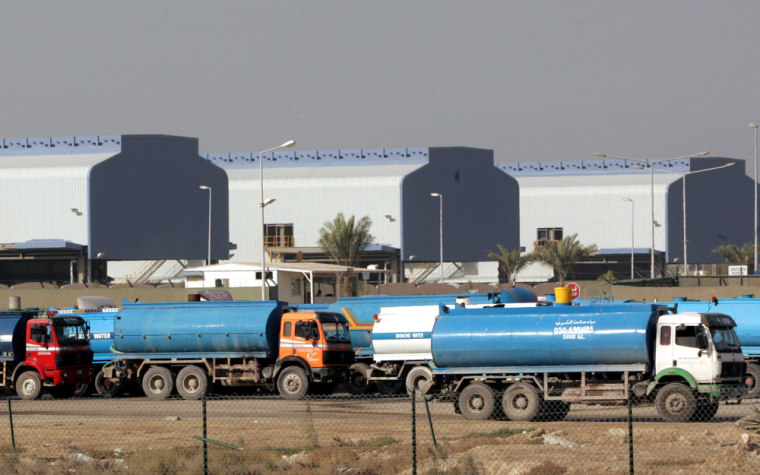When it comes to squandering the earth's natural resources, residents of this desert land of chilled swimming pools, monster 4x4s and air-conditioned malls are on a par with even the ravenous consumption of Americans, according to the World Wildlife Fund.
The average person in the Emirates puts more demand on the global ecosystem than any other, giving the country the world's largest per-capita "ecological footprint," WWF data shows. The United States runs second.
But the oil-rich Emirates is considered a developing country, and even as a signatory to the United Nations' Kyoto protocol on global warming, is not required to cut emissions. The United States is not bound by Kyoto.
Officials: Report is flawed, outdated
Even so, the Emirates government has been embarrassed by the WWF report, which it says is flawed. The federal environment agency is devising strategies to cut emissions, including a public campaign that may offer economic incentives to those who turn down their air conditioning, Saad al-Numairy, an adviser to agency, said Monday.
"We have an action plan," al-Numairy said. "But we are a multicultural country with 180 nationalities. It's not going to be easy."
Energy consumption in the Emirates runs high for many of the same reasons found in the United States: a feeling that the good life requires huge air-conditioned houses and cars, and a disdain for public transportation.
Making matters worse are Dubai's audacious developments, including artificial resort islands that have destroyed coral reefs and an indoor ski slope that still creates snow when it is 120 degrees outside.
"Of all the places to make artificial snow, this has to be the most absurd," said Jonathan Loh, a British biologist who co-authored the WWF report.
Nearby Kuwait, another scorching-hot Persian Gulf oil producer, ranked fifth in the WWF report that emerged in October. Finland was third and Canada fourth.
Environmental officials here say the Emirates ranking is based on outdated information, since the WWF report relies on 2003 data that estimates the country's population at 3 million when it is closer to 5 million.
"It's a fact of life that the UAE will always have a large ecological footprint because of where we are," said Habiba al-Marashi, who chairs the Emirates Environmental Group. "But to be classified as the worst, that hurts. We don't think the report is on solid ground."
Loh acknowledged that factoring in more accurate population figures might put UAE in second place just behind the United States, but "it's still going to show that the UAE is right on the top of the scale."
Full damage not tallied
The country's full damage is not tallied because the WWF study ignores aircraft emissions, Loh said. The UAE emirate of Dubai claims one of the world's busiest airports.
The WWF rankings are measured in "global hectares" — the area of biologically productive land and sea needed to provide the resources consumed by an average person. The Emirates' ecological footprint measured 11.9 global hectares per person, compared to 9.6 hectares per person for the United States and a global average of 2.2 hectares a person.
The country took the top spot because its energy consumption is high and emissions are spread among a small population, Loh said.
The country's landscape offers little help. Undulating sand dunes and jagged mountains of bare rock offer precious little greenery to soak up carbon emissions.
One focal point for Dubai's emissions is the red-and-white smokestacks jutting from gas-fired power plants and an aluminum smelter that line the beach on the city's outskirts. The plants do double duty distilling fresh water from Gulf seawater, an energy-intensive process that accounts for 98 percent of the fresh water in a country with no rivers and little usable groundwater.
In Dubai and Abu Dhabi desalinated water is lavished, Las Vegas-style, on fountains, artificial lakes, swimming pools, resort greenery and golf courses sitting atop once drifting desert sands. Desalination also produces most fresh water in Saudi Arabia and Kuwait, Gulf countries that also showed high footprints.
Due to the country's small size, carbon emissions and consumption in the Emirates are a tiny fraction of that of the United States, and Loh said most efforts to cut greenhouse gases need to concentrate on America and other large industrial countries.
'Happy to be rich now'
But unlike in the United States, energy consumption has not emerged as an issue. The Emirates, like the rest of the oil-producing Gulf states, was until the 1960s an impoverished desert country whose residents survived through subsistence fishing, farming and small-time trade.
Now, the government's energy subsidies give Emirates citizens free water and cheap electricity. Gasoline sells for around $1.70 per gallon.
"Really, we're happy to be rich now," said Majid al-Mansouri, who heads the environment agency serving Abu Dhabi.
The WWF has asked the Emirates government to cut energy use and move toward renewable energy, especially solar power viable in one of the world's sunniest climates.
Al-Mansouri said the country was looking to make improvements, such as running publicly owned vehicles on compressed natural gas — which is cleaner burning but still emits globe-warming carbon dioxide. The state oil company has eliminated 80 percent of its wasteful flaring off of natural gas at oil wellheads, he said.
Other projects once considered environmentally friendly here are being reevaluated. Longtime Emirates ruler Sheik Zayed oversaw the planting of a forestry belt kept alive by irrigation, which is now considered a waste of water. Parts of the forests are being allowed to slowly die off.
"Those forests became a refuge for wildlife," al-Mansouri said. "We have gazelle, oryx and hares because of these forests."
